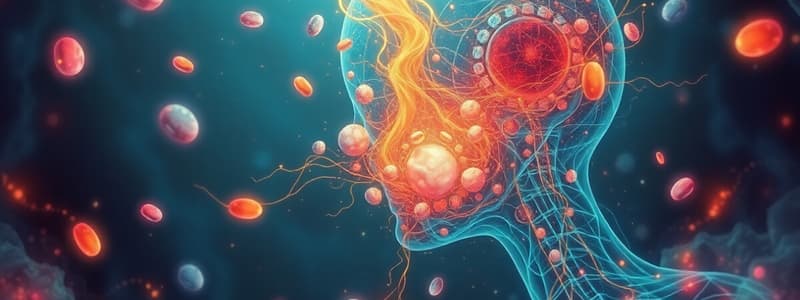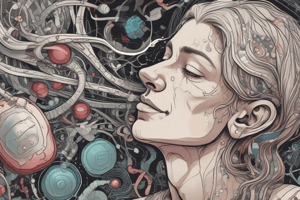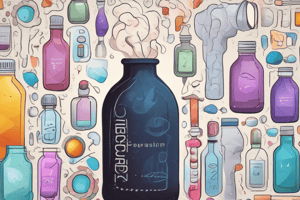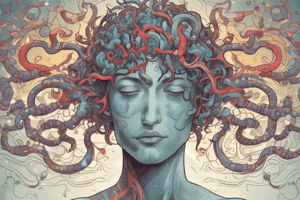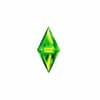Podcast
Questions and Answers
Match the following antidepressants with their primary action:
Match the following antidepressants with their primary action:
Duloxetine = Dual action anti depressant; treats chronic neuropathic pain Selegiline = Transdermal patch for patients unresponsive to SSRIs and TCAs Venlafaxine = Targets serotonin and norepinephrine reuptake Imipramine = Tricyclic antidepressant
Match the following opioids with their primary characteristic:
Match the following opioids with their primary characteristic:
Morphine = Pure Mu agonist Naloxone = Used to reverse overdose; pure antagonist Buprenorphine = Partial Mu agonist; limits respiratory depression Fentanyl = Mu antagonist
Match the following sleep medications with their action:
Match the following sleep medications with their action:
Ramelton = Melatonin agonist Suvorexant = Orexin receptor antagonist Barbiturates = Suppress REM sleep Zaleplon = Short-acting Z drug
Match the following psychedelics with their primary effects:
Match the following psychedelics with their primary effects:
Match the following cannabinoid-based treatments with their use:
Match the following cannabinoid-based treatments with their use:
Match the following addiction treatments with their purpose:
Match the following addiction treatments with their purpose:
Match the following drugs with their therapeutic area:
Match the following drugs with their therapeutic area:
Match the following opioid-related compounds with their action:
Match the following opioid-related compounds with their action:
Flashcards
Duloxetine's function
Duloxetine's function
Treats chronic neuropathic pain and is a dual-action antidepressant.
Morphine's receptor target
Morphine's receptor target
Binds to Mu receptors—a type of opioid receptor.
Naloxone's action
Naloxone's action
Reverses opioid overdoses by blocking Mu receptors.
Buprenorphine's characteristic
Buprenorphine's characteristic
Signup and view all the flashcards
Function of SSRIs and TCAs
Function of SSRIs and TCAs
Signup and view all the flashcards
Mechanism of action of Aspirin/NSAIDs
Mechanism of action of Aspirin/NSAIDs
Signup and view all the flashcards
Gabapentin and Pregabalin's effect
Gabapentin and Pregabalin's effect
Signup and view all the flashcards
Mechanism of action of opioids
Mechanism of action of opioids
Signup and view all the flashcards
Study Notes
Drugs for Depression
- Duloxetine: Treats chronic neuropathic pain, and also a dual-action antidepressant. Active metabolite is desvenlafaxine.
- Selegiline: Transdermal patch, effective in patients not responding to SSRIs and TCAs.
- Venlafaxine: Dual-action antidepressant, targets serotonin and norepinephrine reuptake.
- Imipramine: A tricyclic antidepressant.
Pain and Opioids
- Morphine: Mu receptor target, pure agonist.
- Codeine: Pure Mu agonist.
- Heroin: Pure Mu agonist.
- Naloxone: Reverses opioid overdose, pure antagonist.
- Buprenorphine: Partial mu agonist, limits respiratory depression and abuse potential.
- Suboxone: Combination of buprenorphine and naloxone.
- Pentazocine: Weak Mu antagonist + Kappa agonist, analgesic but dysphoric effects.
- Fentanyl: Mu antagonist.
- Tramadol: Mixed agonist.
- Laudanum: Alcohol and opioids.
- Salvinorin A: Kappa receptor target.
- Kratom: Delta receptor target.
- Aspirin & NSAIDS: Decrease inflammation.
- Gabapentin & Pregabalin: Decrease nociceptor excitation.
- Opioids: Decrease neurotransmitter release by nociceptors.
- Antidepressants & opioids: Activate anti-pain pathways.
- Opioids: Influence cognitive and emotional processing.
Sleep
- Ramelteon: Melatonin agonist.
- Suvorexant: Orexin receptor antagonist.
- Caffeine: Adenosine receptor antagonist.
- Barbiturates & Alcohol: Suppress REM sleep.
- Z-drugs (Zaleplon, Zolpidem, Eszopiclone): Different durations of action (½ hr, a little longer, 6 hrs respectively).
Psychedelics
- Scopolamine: Anticholinergic, used for sedation and twilight anesthesia.
- Ololiuqui: Chemically similar to serotonin.
- Bufotenine: Chemically similar to serotonin, found in toad skin.
- Psilocybin: Chemically similar to serotonin, found in mushrooms.
- MDMA: Enhances communication and empathy.
- LSD: Visual, auditory, and space/time distortions.
- Mescaline: Chemically similar to dopamine and norepinephrine.
- Ketamine: NMDA receptor antagonist, antiglutamatergic.
- PCP: Antiglutamatergic.
- Salvinorin A: Kappa opioid antagonist.
Weed
- Rimonabant: Cannabinoid antagonist, suppresses appetite.
- Carboxy THC: Used for identifying THC in urine tests.
- Sativex: Analgesic, combination of THC and CBD. Suppresses pain to spinal cord, effective for pain with inflammatory conditions.
Drinking
- Diazepam: Prevents withdrawal seizures.
- Disulfiram: Prolongs unpleasant effects of alcohol, prevents relapse.
- Naltrexone: Prevents relapse.
- Lamotrigine: Anticonvulsant.
Addiction
- Naloxone: Heroin antagonist.
- Methadone: Heroin agonist.
- Nicotine patches: Cigarette alternative.
- Varenicline (Chantix): Partial nicotine agonist.
- Disulfiram (Antabuse): Alcohol aversive treatment.
- Suboxone: Aversive treatment for opioids.
Studying That Suits You
Use AI to generate personalized quizzes and flashcards to suit your learning preferences.
